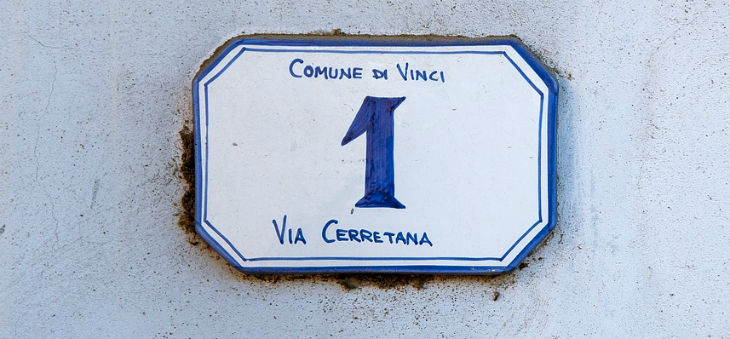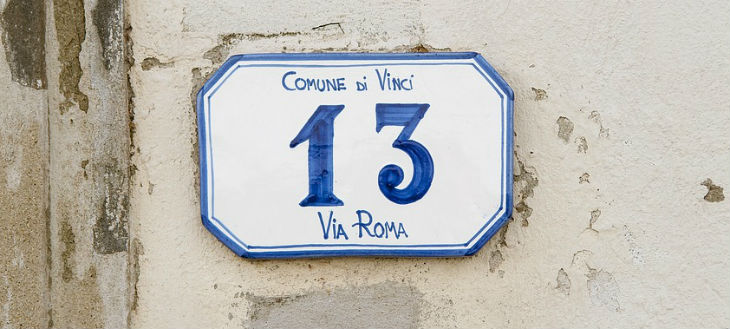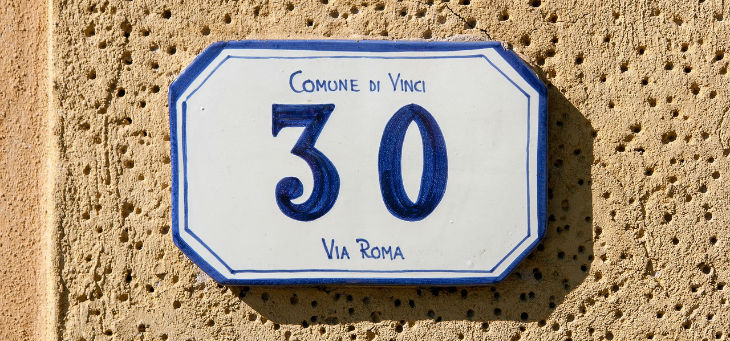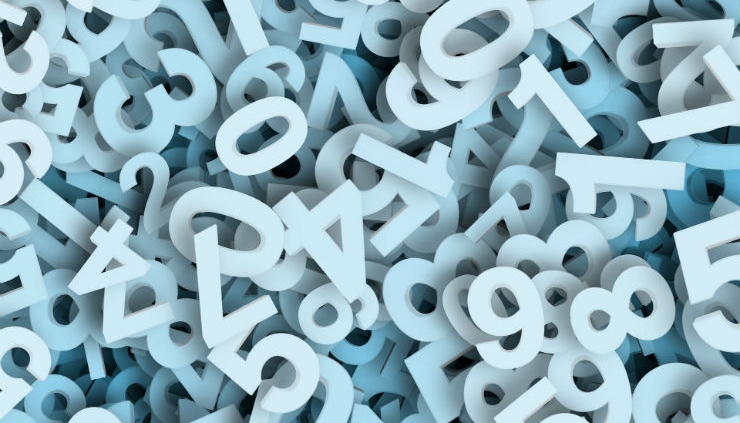If you want to learn Italian language, numbers are one of the first things you must learn!
What are Italian Numbers?
In Italian, like in English, there are two different types of numbers: Numeri Cardinali (cardinal numbers) express the numerical quantity of the name to which they refer: uno (one) , due (two), tre (three), etc.; and Numeri Ordinali (ordinal numbers) express order and distribution, the place a thing or a person occupies in a series or a list: primo (first), secondo (second), terzo (third) and so on. When you learn Italian Numbers, you will be able to express your age when introducing yourself, ask how much something costs, ask what time is it iand say the date.
In this lesson we will study Ordinal Numbers in Italian. You will know how to pronounce them and how to form them in an easy way. Are you ready?
Let’s learn Italian Numbers and start counting in Italian!
Before proceeding, I also suggest to you theese books:
Italian Numbers Chart: Numbers from 0 to 10

| Italian Numbers | Italian Pronunciation |
| 0 – zero | ze-ro |
| 1 – uno | oo-noh |
| 2 – due | doo-ay |
| 3 – tre | treh |
| 4 – quattro | kwat-tro |
| 5 – cinque | cheen-kweh |
| 6 – sei | seh-ee |
| 7 – sette | set-teh |
| 8 – otto | oht-toh |
| 9 – nove | no-veh |
| 10 – dieci | dee-eh-chee |
As you can see, Italian Numbers from zero to ten are not very difficult to learn and some numbers are very similar to English ones, which helps memorization.
Repeat them several times, starting counting in Italian, then read examples to help you remember them in a context!
Examples:
Ho sei anni.
I am 6 years old.
Il Manchester ha vinto due a zero.
Manchester won 2-0.
Ho mangiato tre gelati di fila e adesso ho il mal di pancia.
I ate 3 ice creams in a row and now I have a stomach ache.
Quanti fratelli hai? Solo uno.
How many brothers do you have? Only 1.
Alle quattro e cinque ho una lezione di italiano.
At 4:05 pm I have an Italian lesson.
Quanto costa questo jeans? Sette euro e dieci centesimi
How much does this jeans cost? 7 euros and 10 cents.
It’s really easy to remember them, isn’t it? Now let’s see Italian Numbers from 10 to 20!
Italian Numbers Chart: Numbers from 10 to 20

| Italian Numbers | Italian Pronunciation |
| 10 – dieci | dee-eh-chee |
| 11 – undici | oon-dee-chee |
| 12 – dodici | doo-dee-chee |
| 13 – tredici | tray-dee-chee |
| 14 – quattordici | kwat-tor-dee-chee |
| 15 – quindici | kween-dee-chee |
| 16 – sedici | seh-dee-chee |
| 17 – diciassette | dee-chah-sset-teh |
| 18 – diciotto | dee-choht-toh |
| 19 – diciannove | dee-chahn-noh-veh |
| 20 – venti | ven-tee |
Italian numbers from ten to twenty are irregular but still follow some “rules” that can help you to remember them. Let’s look at them:
- Italian Numbers from 11 to 16 are composed by the root of the one-digit numbers followed by “dici” (tre + dici = TREdici)
- Italian Numbers from 17 to 19 are formed by “dici” followed by the one-digit numbers (dici + otto = diciotto).
NOTE: even if it is similar to the one-digit words, there are some differences in vowels or consonants.
In the Italian numbers seventeen and nineteen there is also an “a” and the doubling of the consonants (dici + sette = diciassette, dici + nove = diciannove)
Examples:
L’ho comprato tredici anni fa.
I bought it 13 years ago.
Quanto costa? Quindici dollari.
How much? 15 dollars.
Ho venduto quattordici libri oggi.
I sold 14 books today.
Ci siamo sposati diciannove anni fa.
We got married 19 years ago.
Che ore sono? Le diciassette.
What time is it? It’s 5 pm.
Ha studiato italiano per soli diciotto mesi ed è già bravissimo.
He studied Italian for only 18 months and he is already very good.
Now that you know how to count in Italian to 20, you have done most of the work!
In fact, from now on it is very easy to learn the rest of Italian Numbers and in particular the Italian Tens.
Ready, set , go!
Italian Numbers Chart: Numbers from 20 to 30

| Italian Numbers | Italian Pronunciation |
| 20 – venti | ven-tee |
| 21 – ventuno | ven-too-noh |
| 22 – ventidue | ven-tee-doo-eh |
| 23 – ventitre | ven-tee-treh |
| 24 – ventiquattro | ven-tee-kwaht-troh |
| 25 – venticinque | ven-tee-cheen-kweh |
| 26 – ventisei | ven-tee-seh-ee |
| 27 – ventisette | ven-tee-set-teh |
| 28 – ventotto | ven-toht-toh |
| 29 – ventinove | ven-tee-noh-veh |
| 30 – trenta | tren-tah |
The “addition rule”
As you can see, Italian Numbers from ventuno (twenty-one) onwards are very simple to form. The rule is to use the one-digit Number from uno (one) to nove (nine) at the end of the Tens Number.
It is like an addition!
venti + sette = ventisette
venti + quattro = ventiquattro
venti + nove = ventinove
trenta + sei = trentasei
trenta + sette = trentasette
…and so on
NOTE: when the Tens Number ends with a vowel and the one-digit number begins with a vowel, then the last one of the Tens fall. As you can see, this rule applies to uno (one) and otto (eight). You will note that venti (twenty) loses the final -i and trenta (thirty) loses the final -a:
venti + uno = ventuno
venti + otto = ventotto
trenta + otto = trentotto
trenta + uno = trentuno
Examples:
Gigi ha ventiquattro anni.
Gigi is 24 years old.
Sono ventotto gradi.
It’s twenty-eight degrees.
Che ore sono? Sono le venti e trenta.
What time is it? It’s 8:30 pm.
Stiamo insieme da trentuno anni.
We’ve been together for 31 years.
Remember this “addition rule”, because it is applied for remaining other Italian Tens Numbers.
Let’s see them together!
Italian Numbers Chart: Tens Numbers from 20 to 100

| Italian Numbers | Italian Pronunciation |
| 20 – venti | ven-tee |
| 30 – trenta | tren-tah |
| 40 – quaranta | kwah-rahn-tah |
| 50 – cinquanta | cheen-kwahn-tah |
| 60 – sessanta | ses-sahn-tah |
| 70 – settanta | set-tahn-tah |
| 80 – ottanta | oht-tahn-tah |
| 90 – novanta | noh-vahn-tah |
| 100 – cento | chen-toh |
As you can see from the chart, even Italian Tens Numbers follow a rule that can help you to remember them. Let’s see it:
- Italian Numbers from 30 to 90 are composed by the root of the corresponding one-digit numbers followed by “anta”, with some changing in vowels or consonants sometimes:
cinque + anta = cinquanta
sette + anta = settanta - The “addition rule” that we have seen before to form is valid to form other Italian Numbers:
trenta + sette = trentasette
cinquanta + quattro = cinquantaquattro
settanta + sei = settantasei
Examples:
Quella signora ha ben quarantaquattro gatti!
That old lady has 44 cats!
Mio nonno aveva novantanove anni.
My grandfather was 99 years old.
Prima di parlare, conta fino a cento!
Before speaking, count to 100!
NOTE:
- contare fino a cento is a common Italian way of saying that you have to wait and think a lot before you take a final decision or to speak in a rash way.
- Remember that tre (three) has no accent, while ventitré (twenty-three) and trentatré (thirty-three) are written with an acute accent.
Examples:
Si deve tagliare in ventitré pezzetti.
It has to be cut in 33 pieces.
Alla festa c’erano ventitré invitati.
There were 23 guests at the party.
Italian Numbers Chart: Big Numbers after 100
| Italian Numbers | Italian Pronunciation |
| 100 – cento | chen-toh |
| 200 – duecento | doo-eh-chen-toh |
| 300 – trecento | treh-chen-toh |
| 400 – quattrocento | kwaht-troh-chen-toh |
| 500 – cinquecento | cheen-kweh-chen-toh |
| 1.000 – mille | meel-leh |
| 2.000 – duemila | doo-eh-mee-lah |
| 10.000 – diecimila | dee-eh-chee-mee-lah |
| 1.000.000 – un milione | oon mee-lee-oh-neh |
| 2.000.000 – due milioni | doo-eh mee-lee-oh-nee |
| 1.000.000.000 – un miliardo | oon mee-lee-are-doh |
To learn Italian numbers greater than 100 is very useful when talking about years or dates. As you can see from the chart:
The Hundreds are formed by the one-digit Number followed by “cento”:
due + cento = duecento
quattro + cento = quattrocento
Examples:
La carica dei cento e uno è un famoso film di Walt Disney.
One Hunded and One Dalmatians is a famous Walt Disney movie.
Ho speso 300 dollari per quella borsa!
I spent 300 dollars for that bag!
Thousands are composed by the one-digit Number followed by “mila”:
tre + mila = tremila
cinque + mila = cinquemila
Examples:
Gli hanno rubato merci dal valore di cinquemila dollari.
They stole goods worth 5.000 dollars.
Mi deve dei soldi… Circa tremila dollari.
He owes me money, like 3.000 dollars.
Sono nato il diciotto ottobre millenovecentonovantaquattro.
I was born on October 18th 1994.
NOTE: the number uno (one) becomes un before a masculine noun, so we have un milione (one million) and un miliardo (a billion). Also, a million and a billion have a regular plural in -i.
Examples:
Possono esserci un milione di combinazioni!
There could be a million of combination!
Lo farebbe anche se ci fosse una possibilità su un miliardo.
He would do that even if there’s a chance in a billion.
L’estinzione dei dinosauri è avvenuta circa sessantacinque milioni di anni fa.
The extinction of the dinosaurs took place about 65 million years ago.
Italian Idioms and Proverbs with Numbers

Now you have learned the Italian Numbers and are ready not only to count in Italian, but also to do calculations and use numbers in whatever situation
To conclude, If you really want to “sound Italian”, I will give you some Italian idiomatic expressions and proverbs with numbers that are really used a lot in everyday conversation in Italy. For every example I will give you the word by word translation and the explanation of the meaning of the Italian Idioms:
DARE I NUMERI
This is a very common Italian expression: it is used when you accuse someone of talking nonsense, or worse, of saying meaningless sentences.
Literally it means “to give numbers”, but you can translate it in english with to loose somebody’s mind or you are going crazy!.
Example:
È da due settimane che dormi in questo ufficio, inizierai a dare i numeri!
You’ve been sleeping in this office for two weeks, you will lose your mind!
FARSI IN QUATTRO / SUDARE SETTE CAMICIE
This is a very common way of saying in Italian to explain how a person makes a lot of effort to make a certain action, achieving a certain result.
Literally the translation would be “to become four” and with this sentence we want to explain how someone can be willing to multiply their behavior to complete a commitment. In English the same way of saying can be translated as to work (very) hard or to make a great effort.
Example:
mi sono fatta in quattro per te e questo è il ringraziamento!
I worked hard for you and this is your thank you!
NOTE: the farsi in quattro expression can be replaced by another Italian idiom: sudare sette camicie. This is an expression that is really very common in Italy, and it has a similar meaning to the previous one.
Literally, it can be translated as “to sweat seven shirts”. It means that you work very hard to get something. In English you would say to make a great effort in order to achieve a result and work really hard.
Examples:
Ho sudato sette camicie per arrivare qui / mi sono fatto in quattro per arrivare qui.
I’ve worked really hard to get here.
CHI FA DA SÈ FA PER TRE!
This is a very common Italian Proverb. It means that if a person undertakes on his own, he may be able to do it better than he could do it by involving other people.
Literally the translation would be “those who do something on their own, they do as they were three of them”, but in English you would surely say “if you want something done, do it yourself”.
Example:
Marco non mi ha per nulla aiutata nel progetto… è proprio vero che chi fa da sé fa per tre! – Mark did not help me at all in doing the project.. It is true that if you want something done, do it yourself!
TRA I DUE LITIGANTI IL TERZO GODE
This is an Italian Proverb that is very used. It means that between two people who quarrel over something, a third party often prevails, waiting for the moment of greatest weakness or distraction of the two contenders.
Literally the translation is “between two parties arguing, the third gains”, but in english you can say when two people fight, the third one wins”.
Conclusion
Now you are ready to answer questions with Italian Numbers in Italian! You can try to use the idiomatic expressions or proverbs you just learnt to sound like a real Italian! Once you begin, you will never stop counting in Italian!
The important thing is that… You won’t start a dare i numeri!



